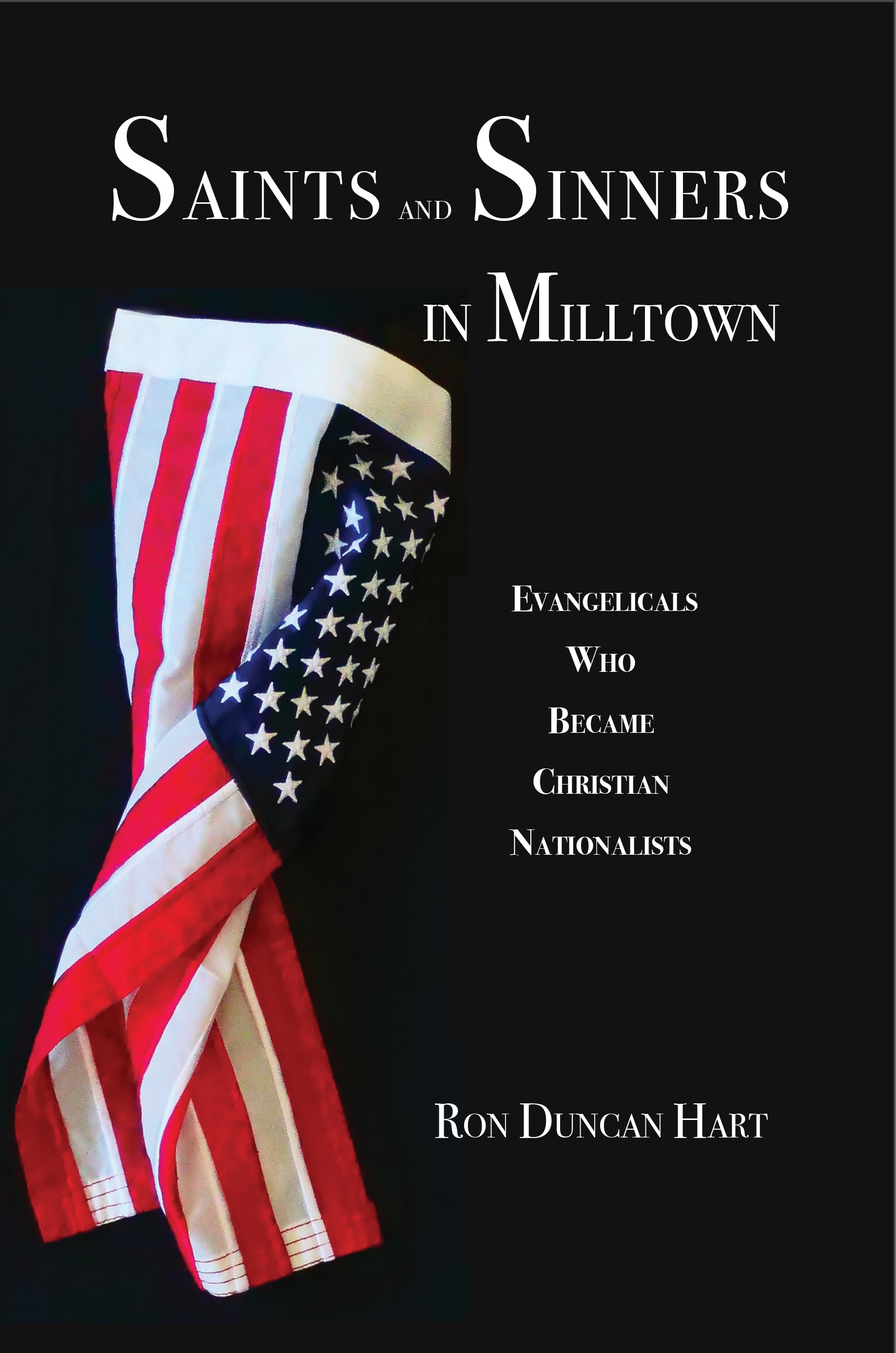


Evangelicals and MAGA
The Politics of Grievance a Half Century in the Making
"Hart's work with a particular community of milltown workers in the later 1960s and early 1970s yields rich fruit here in a careful examination of the roots of what and who became members of the Tea Party and Trump evangelicals. This rich anthropological exploration provides a deeper, empathetic, and therefore even more alarming comprehension than reams of political commentary and polemics."
-- Paul Harvey, Distinguished Professor of History
University of Colorado, Colorado Springs
Christian Nationalism has Become a Major Factor in American society in the last fifty years, and Saints and Sinners in Milltown is about the origins of the movement in the 1970s in one group of working class people in Atlanta. They were reacting to the transformative decades (1954-1973) when the Federal government changed the American judicial landscape from the banning of segregation in schools (1954) to civil rights (1964) and approval of abortion (1973). The preachers in Milltown were denouncing those laws and judicial decisions as unchristian and arguing that the government itself had been taken over by unchristian forces. The older people of Milltown, who had lived their entire lives with White privilege in the Jim Crow South, were protesting as they lost that status, and they called for Christian leadership in government to establish Christian principles as the law of the land, reinstating segregation, Bible reading, and prayer in schools among other issues. Christian nationalism in this context was about Christians taking control of government and establishing Christian principles to run the country.
Preachers talked about the superiority of White people in their sermons. The Baptist preacher in Milltown denounced integration and the mixing of White and Black people in terms like this,
"The problem today is that we are losing the children to the Devil. Negroes and Whites are together, and it ain’t right. It’s the communists who are behind it… As mentioned earlier, the term “communists” was a metaphorical reference to foreignness and non-Christians, especially Jews."
Strong statements of antisemitism and racism were spoken from the most important religious pulpits in the village . In his book "White Too Long" Robert Jones argues that Baptists have a “legacy of racism and white supremacy”, and he goes further to say that “White evangelicals have captured most of the historical spotlight because of their overt support for slavery, Jim Crow laws, and segregation…”
Christianity and the belief in White superiority have been historically linked in the American South from preachers as Ku Klux Klan members to Christian legislators banning books and passing laws to ensure White political control. Whiteness and Blackness were about more than skin color. Being White included social and legal privileges and economic position and being superior to non-Whites. Being Black was the oppose, it implied poverty and lack of legal or social rights within the community.
About Ron Duncan Hart:
Ron Duncan Hart is a cultural anthropologist (Ph.D. Indiana University) with postdoctoral work at the Centre for Hebrew and Jewish Studies, University of Oxford. Until recently he was a Research Associate of the Latin American and Iberian Institute at the University of New Mexico. Duncan Hart has done research on Jewish traditions in Spain, North Africa, and South America with special attention to the role of Jews and Muslims in the Andalusian exchange. He is former Dean of Academic Affairs at Inter American University of Puerto Rico. He was Project Director in Latin America with the Ford Foundation, the International Development Research Centre of Canada, and UNICEF. He is former president of the Jewish Federation of New Mexico.
Duncan Hart has awards from the National Endowment for the Humanities, National Endowment for the Arts, the National Science Foundation, Ford Foundation, and New Mexico Jewish Historical Society among others.
He has been honored as the Neustadt Lecturer on Judaic Studies (Oklahoma City University) and a Schlezinger Lecturer on Jewish legal history (Ohr Kodesh in Chevy Chase). He has been an invited lecturer at Tulane University, University of Oklahoma, and Xinjiang University (Urumqi, China), National Labor Relations Board, and a senior Fulbright lecturer at the National University, Bogotá, Colombia among others.
He is author and co-editor of the award-winning book Fractured Faiths: Spanish Judaism, the Inquisition and New World Identities and historical consultant for the exhibition of the same title at the New Mexico History Museum in Santa Fe (2016). His most recent books are Sephardic Jews: History, Religion and People (2016) and Crypto-Jews: The Long Journey (2020).
ISBN: 9781935604907. Paper. $19.95 242 pages
Available from local bookstores
Distributed by Ingram.
For further information
Call 505.920.7771
or send e-mail to admin@tolerancestudies.org
Institute for Tolerance Studies
•Home •Sephardic Traditions •Women's Voices •Jewish Thought & Practice
•New Titles •Award Winners •Meet Gaon Authors •About Gaon Books •Contact
Us